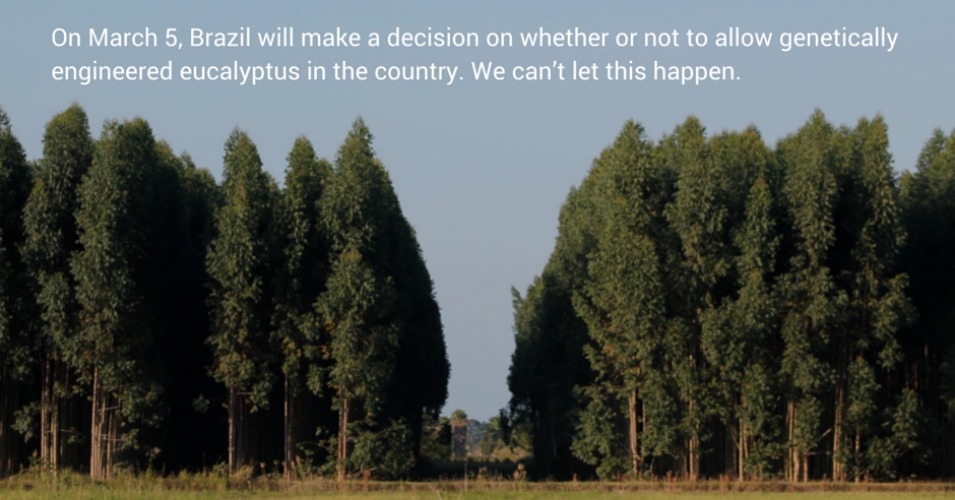by
Rachel Smolker

A fight is underway to stop the the aggressive planting of genetically-modified trees not only in Brazil, but all over the world. (Image: Stop GE Trees)
On Thursday, the Brazilian Landless Workers Movement, MST, made it quite clear that they, along with groups all over the world, soundly reject genetically engineered trees. Futuragene, a company owned by Suzano, one of Brazil’s largest pulp producers, had recently applied for commercial release of a GE eucalyptus. A decision by the country’s biosafety commission, CTNBio, was expected to take place. Over the past week, groups around the world organized and participated in an “emergency day of action” standing vigil outside of Brazilian embassies urging that GE trees not be approved. A letter delivered to all the relevant ministries stated:
By way of this letter, we want to express our profound indignation with a possible decision of the CTNBio to authorize the commercial release of genetically engineered (GE) eucalyptus, requested by FuturaGene, a biotechnology company fully owned by pulp and paper company Suzano.
Then, as the meeting between CTNBio and Futuragene was about to occur, around 1,000 peasant women from the Brazilian Landless Workers Movement, MST, took over Futuragene’s offices in Sao Paulo, and 300 more interrupted the meeting with CTN Bio. The meeting was cancelled and no decision was made regarding the GE tree.
This was not the first expression of “profound indignation” with respect to GE trees, which have in fact met with very strong and ongoing public opposition every step of the way. Tree biotechnology interests claim to be providing solutions: trees that grow faster and provide more wood, or trees that are resistant to disease, or trees that can withstand droughts, etc. But this is a clear example of how the proclaimed search for solutions to our climate and environmental woes can be manipulated and run amok. Climate “solutions” that involve trees and forests seem especially vulnerable. For example, on the one hand, there is much ado about using forests as carbon sinks, and allowing those to be served up as “offsets” to polluters (aka “Reducing Emissions from Deforestation and Forest Degradation”, or REDD).
On the other hand, many others, (the Obama administration and its agencies especially) are promoting the large scale conversion of forests and fields into fuel – burning trees and “energy crops” for commercial and industrial scale electricity and heat or refining them into liquid fuels and chemicals. All are subsidized as clean, green, “carbon neutral” and renewable alternatives to fossil energy. The Department of Energy has a program referred to as “PETRO”, for “plants engineered to replace oil”. And they are currently undergoing a NEPA environmental impact assessment process for establishing a new funding program to speed field testing and deployment of “engineered high energy crops”.
Keen to profit from all this new and insatiable demand for “biomass”, the tree biotechnology industry is promoting their “faster growing”, “freeze tolerant” or “denser wood” trees, as well as trees that secrete certain chemicals or have other “useful” properties that make them amenable to use for fuels, chemicals, even plastics. The idea of GMO contamination spreading from trees engineered for fuels and chemicals, into native forests is fundamentally revolting. Since trees can spread seeds and pollen over great distances, contamination would be virtually impossible to prevent and once it occurs, irreversible.
Companies like Arborgen, a major player in tree biotechnology, have struggled to win over public support. The company is currently testing an engineered eucalyptus in fields across the southern USA with over 250,000 trees. The testing permit was met with a legal challenge that by some admissions was responsible for Arborgen’s failure to achieve its desired Initial Public Offering on stock. During their public comment period, 17,500 comments submitted opposed USDA recommendation to permit field testing of a quarter million GE eucalyptus. Only 39 were supportive. Nonetheless, USDA permitted the field trials and Arborgen have applied for deregulation a decision now pending. It seems unlikely in the end that USDA will refuse commercial release. The agency has proven itself a darling of the biotechnology industry, recently even permitting 2,4,D resistant crops as “safe”.
In fact the USDA is reluctant to regulate at all, having recently paved a pathway for Arborgen to bypass regulation altogether, and approving one of their engineered loblolly pines without any review or public process. The International Campaign to Stop GE Trees, in a January 29th press release responded:
Groups from around the world today joined together to denounce the US government for allowing the first genetically engineered tree, a loblolly pine, to be legalized with no government or public oversight, with no assessment of their risks to the public or the environment, and without regard to overwhelming public opposition to GE trees.
The loblolly is engineered to have “denser wood”, a characteristic that is likely highly favored by energy companies setting up wood pellet manufacturing facilities across the pine plantation covered southern states. Wood pellets are “the new coal” with government renewable energy subsidies offered when coal plants cofire wood with coal. Denser wood burns better.
The USDA decision to bypass regulation was based on a gaping loophole evolving from antiquated circumstances. According to Center for Food Safety scientist, Doug Gurian Sherman:
In the early days of genetic engineering, the large majority of GE crops used plant pest genes or processes. But that is no longer the case. The large majority of potentially useful, and possibly harmful, genes—whether from other plants, microbes, or animals—no longer come from pests. And many kinds of harm that GE crops may cause, like resistant weeds or the loss of monarch butterflies, are not captured by USDA’s current definition of “plant pest” harm.
In other words, USDA won’t regulate, even though the risks and potential for unanticipated consequences are at least as serious if not more so.
Arborgen has meanwhile been seeking to expand their reach in Brazil, where eucalyptus plantations already abound as they serve the pulp industry and position themselves to further supply “biomass” for energy markets.
Meanwhile, in faraway Malaysia, there is fresh brewing concern over field trials of a rubber tree engineered to secrete pharmaceutical compounds in latex. In biotechnology labs around the world, tree engineers are working to create trees amenable to producing “biomass”, secreting chemicals useful for plastics and pharmaceuticals and much more. A virtual war has been waged in the press over the proclaimed safety of GMO food crops as many states have attempted, or (in my home state of Vermont) succeeded in passing GMO labeling laws.
But objections to GMOs do not end with food crops. For many the issue is not purely a matter of reviewing what scientists claim or fail to claim about the health impacts of eating GMO foods. Rather we reject GMOs, including trees and “non food” crops and creatures (fish, livestock etc.) because we do not believe that people, and especially people working for profit, are knowledgeable or wise enough to “control” the code of life. We do not have confidence that scientists in biotechnology labs can outsmart millions of years of evolution, nor understand and anticipate all of the intricacies, shifting dynamics or interactions that make up ecology and evolution.
One need only look at the track record for GMO crops. Cross contamination with non-engineered crops and native varieties is common, and has led to absurd legal battles wherein, for example, farmers are sued by Monsanto because pollen from neighboring GMO planted fields blew onto their fields and contaminated their crops. And there are many other impacts – from increased use of glyphosate and other pesticides and herbicides, to the loss of monarch butterflies, to the development of herbicide resistant weeds, to the depletion of soil microbe communities and much more – should be enough to cause us to reject GE trees outright before they ever reach commercial production.
Rachel Smolker, Ph.D. is codirector of Biofuelwatch and member of the Campaign to Stop GE Trees and the Global Forest Coalition. She lives in Vermont.

